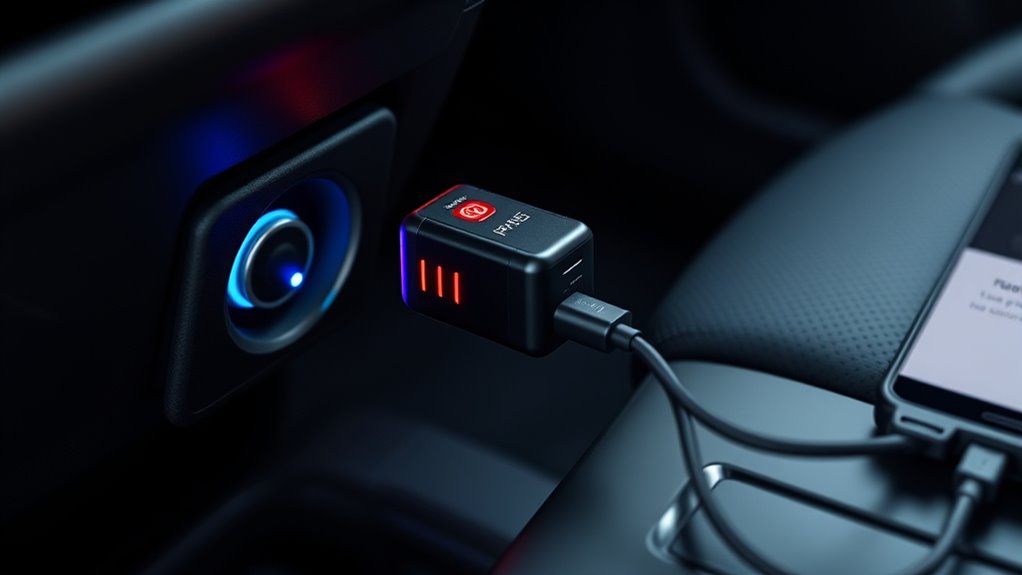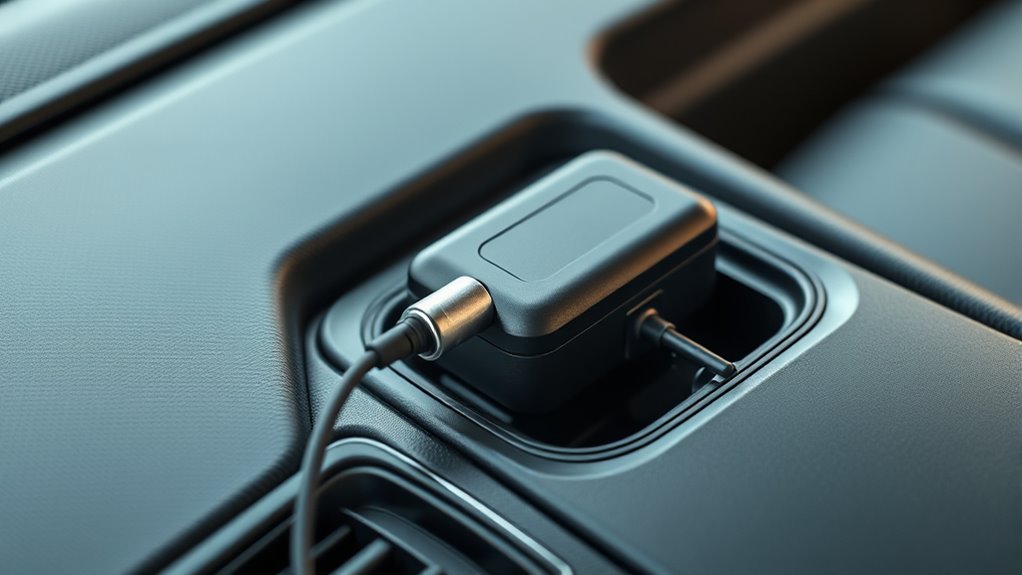To charge your power station via the cigarette lighter, choose a high-quality car charger with safety features like overcharge and overheating protection. Make certain it has the right output to match your power station’s requirements, preferably with multiple ports for convenience. Always connect securely and avoid cheap, unbranded chargers that can damage your device or your vehicle. For tips on choosing the safest and most efficient options, keep exploring further details.
Key Takeaways
- Ensure your power station supports 12V DC input compatible with car cigarette lighter sockets.
- Use a high-quality car charger with appropriate amperage and safety features for reliable charging.
- Confirm the charger has the correct connector type and voltage specifications for your power station.
- Avoid overloading the cigarette lighter socket; check both the car’s and charger’s maximum current ratings.
- Follow safety precautions, such as unplugging when not in use and inspecting for heat or damage during charging.

Have you ever been stranded with a dead phone or GPS just when you needed them most? It’s a frustrating experience, especially when you’re relying on your devices to navigate or stay connected. That’s where a good car charger becomes your best friend. Using your vehicle’s cigarette lighter socket, you can power up your devices quickly and efficiently. Car chargers are essential portable accessories that ensure you stay connected on the go, whether you’re on a road trip or just running errands around town. They’re compact, easy to use, and designed to provide a steady power supply to your smartphones, tablets, or even portable power stations, making them invaluable for maintaining your device’s battery life.
Never run out of power on the road with a reliable car charger.
When choosing a car charger, always prioritize charging safety. Not all chargers are created equal, and some may pose risks if they’re poorly made or incompatible with your device. Look for chargers that meet safety standards, have built-in protections against overcharging, overheating, and short circuits. These features prevent damage to your device and ensure safe, reliable charging. Remember, portable accessories like car chargers are convenient, but they can also be dangerous if used improperly. Never leave a charger plugged in for extended periods when your vehicle is off, as this can cause electrical issues or drain your car’s battery. Always unplug your charger when not in use, especially if you notice any unusual heat or smell, which could indicate a faulty connection or a defective device.
Another safety tip is to avoid cheap, unbranded chargers. They might seem like a bargain, but they often lack the necessary charging safety features and can damage your device or cause electrical fires. Instead, opt for reputable brands that have good reviews and certifications. It’s also wise to ensure your vehicle’s cigarette lighter socket is in good condition; a loose or damaged socket can affect charging performance and safety. When plugging in your device, make sure the connection is secure, and don’t force the plug if it doesn’t fit easily—forcing it can damage the socket or the charger.
In addition to safety, consider the capacity of the charger. If you need to power multiple devices or larger portable accessories, look for a model with multiple ports or higher amperage output. This way, you can charge everything you need without compromising safety or speed. A high-quality power delivery feature can significantly improve charging efficiency and reduce charging time, especially for larger devices. With a reliable car charger, you’ll never have to worry about losing contact or running out of power at critical moments. It’s a simple investment that keeps your devices ready whenever you need them, making your journeys safer and more convenient. Just remember, always prioritize charging safety and choose quality portable accessories to get the most out of your car charger.
Frequently Asked Questions
Can Car Chargers Damage My Vehicle’S Cigarette Lighter Socket?
You might wonder if using a car charger can damage your vehicle’s cigarette lighter socket. Generally, if the charger matches your vehicle’s electrical system and power requirements, it shouldn’t harm the socket. However, frequent or high-current use can strain the cigarette lighter socket durability over time. To avoid issues, verify your charger is compatible and avoid overloading the socket, helping maintain your vehicle’s electrical system health.
What Safety Features Should I Look for in a Car Charger?
Think of a car charger as a trusted guardian for your devices. You should look for safety features like overcurrent protection, which prevents too much power from flowing through, and thermal shutdown, which stops it from overheating. These features act like a safety net, keeping your devices safe and your vehicle’s socket intact. Choosing a charger with these protections guarantees worry-free charging on the go.
How Long Does It Take to Fully Charge a Power Station?
You’re wondering how long it takes to fully charge a power station. The charging time depends on its battery capacity and the charging speed of your setup. Smaller stations with lower capacity can charge in a few hours, while larger ones may take 8-12 hours or more. Using a high-quality car charger with fast charging capabilities can markedly reduce the charging time, ensuring you’re ready to go sooner.
Are Car Chargers Compatible With All Power Station Models?
Think of car chargers as keys; not all fit every lock. While some offer universal compatibility, allowing you to connect with various power station models, others are designed for specific brands or models. Always check the charger’s specifications and your power station’s inputs to guarantee a proper match. This way, you avoid the frustration of incompatible connections and keep your devices powered smoothly, no matter the model.
Can I Use a Car Charger to Power Multiple Devices Simultaneously?
You can use a car charger to power multiple devices at once, but be cautious with daisy chaining. It’s not recommended because it can overload your power station or car’s cigarette lighter socket. Instead, opt for a power distribution setup that guarantees each device receives safe, adequate power. Always check your charger’s capacity and your power station’s limits to avoid damage or safety hazards.
Conclusion
Using a car charger via your cigarette lighter is a convenient way to power your station on the go, but don’t assume it’s the fastest or most efficient method. While some believe that frequent use of these chargers might impact your vehicle’s electrical system, modern designs mitigate most risks. Ultimately, if you want quick, reliable charging, consider dedicated power stations or higher-capacity solutions. Still, for everyday needs, your cigarette lighter remains a practical, if modest, option.









